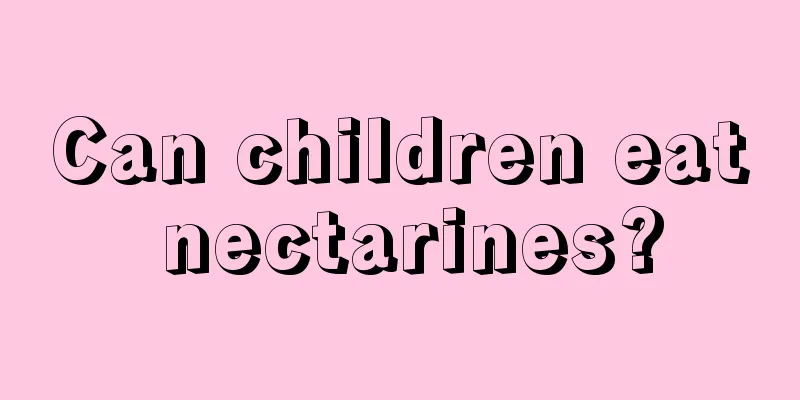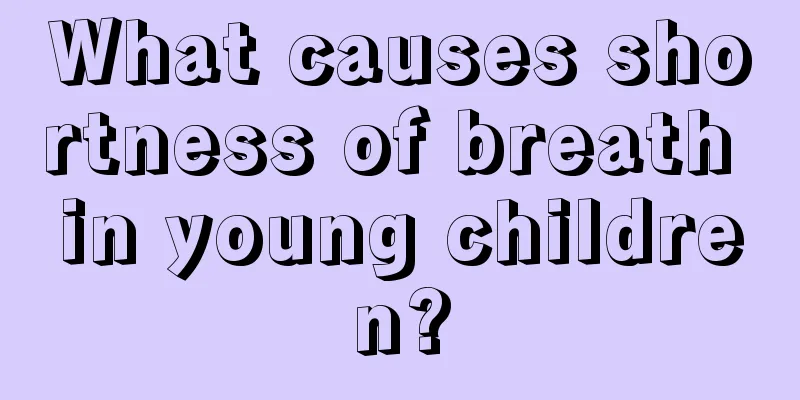What to do if your eight-month-old baby has flat blood

|
Iron deficiency anemia is a common disease in children. Because the body does not get enough iron to meet the production of red blood cells, symptoms of anemia will appear. Research has found that iron deficiency anemia often occurs in many young children, especially infants between 6 and 3 years old, who are most prone to this problem. Therefore, parents should not think that anemia only occurs in adults, or that children are not sick if they have no symptoms. Iron deficiency anemia is a common disease in children. It is caused by the fact that the body's iron reserves cannot meet the needs of red blood cell production. According to surveys, the main group of people suffering from iron deficiency anemia are infants and young children aged 6 months to 3 years. Why does iron deficiency occur? Insufficient iron reserves in the body at birth More than 75% of the total iron in a newborn's body is in hemoglobin, so the iron content in a newborn's body mainly depends on blood volume and hemoglobin concentration, and blood volume is proportional to body weight. Therefore, the lighter the birth weight, the less total iron in the body and the greater the likelihood of anemia. In addition, blood transfusion from the fetus to the mother through the placenta, blood transfusion from one twin fetus to the other, and rupture of placental blood vessels during delivery may affect the iron content in the newborn's body and cause iron deficiency anemia. Dietary iron deficiency: Infants mainly feed on dairy products, which contain very low levels of iron. The iron content in breast milk is related to the mother's diet, and generally contains 1.5 mg/L of iron. The iron content in bovine milk is lower than that in human milk, and even less than that in goat milk. The absorption rate of iron in human milk is higher than that in cow's milk. It is difficult for 6-month-old babies to get enough iron from breast milk. They should add iron-fortified formula milk and complementary foods in time, otherwise anemia is likely to occur. Too fast growth rate: Young children grow and develop rapidly, and their blood volume increases quickly. Under normal circumstances, an infant's weight doubles when he or she is 5 months old, and doubles when he or she is 1 year old. The weight gain for premature infants is even faster, increasing by 6 times at 1 year old. Therefore, premature infants' need for iron is much greater than that for normal infants. Premature infants' iron requirement within 1 year after birth is 177% more than that of full-term infants. If sufficient iron is not supplied in time, anemia is bound to occur. Symptoms of anemia in babies: 1. Color changes: The baby's face is pale, and the color of lips and nails becomes lighter. The nail bed is white, and the blood color recovers very slowly after being pressed by hand. The nails are brittle and easy to break. 2. Mental symptoms: Babies are often listless, inattentive, easily agitated, and easily fatigued after some activities. Older children may also experience headaches, dizziness, tinnitus, black spots in front of their eyes, and palpitations and shortness of breath after activities. 3. Changes in taste: Babies with anemia may also experience decreased appetite, abdominal distension, nausea, and constipation. Babies with severe anemia like to eat foreign objects, such as soil, wall paint, etc. 4. Developmental status: The baby's breathing and heart rate increase, angular cheilitis and glossitis often occur, hair becomes dry, growth and development lags, and even intelligence declines. In addition, the baby's immunity is reduced, making it easy to be infected by various diseases. The hazards of anemia: In severe cases, it can cause multiple metabolic disorders in the human body, thereby affecting the functions of multiple organs, such as the digestion and absorption function of the digestive system, muscle movement function, immune function, etc. Note: The impact of anemia on intelligence is irreversible, so iron deficiency anemia must be treated promptly! |
<<: Eight-month-old baby has a bad mouth
>>: What should I do if my eight-month-old baby has a fever?
Recommend
Newborn baby eats bottle instead of nipple
Newborns who feed from bottles instead of nipples...
The relationship between children's "three measurements" and physical health
Of course, parents don’t want their children to g...
How do children eat cheese?
Cheese is rich in many nutrients, such as protein...
What should I do if my one month old baby doesn't sleep during the day?
Is it normal for babies not to sleep during the d...
What should I do if my child keeps coughing?
When the weather is changeable, children are most...
Can my baby get a vaccination if he has phlegm in his throat?
Because newborn babies have relatively weak body ...
What to do if the newborn baby has not defecated for four days
When taking care of your baby, you always need to...
What is the reason for children's frequent urination?
Parents will be very worried when their children ...
What causes dry eyes in children?
Children's eyesight must be protected, but re...
Can I pinch my baby's flat nose to make it taller?
Parents all hope that their children will grow up...
What should I do if my child hits his chin and has a protrusion on the bone?
Because children are naturally active, it is inev...
How to treat and prevent synovitis in children
Many people do not understand synovitis. In fact,...
Little boy foreskin inflammation
It is a common phenomenon for many little boys to...
Hand, foot and mouth disease prevention knowledge
There are many common diseases in life. Different...
What to do if a child has a cold, cough and phlegm
I believe that all parents know that it is very d...









